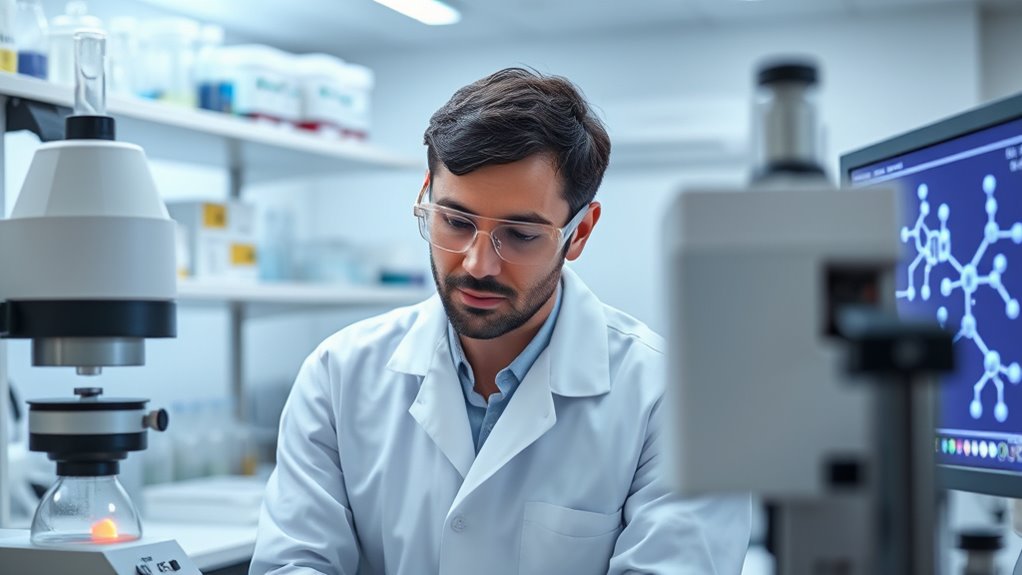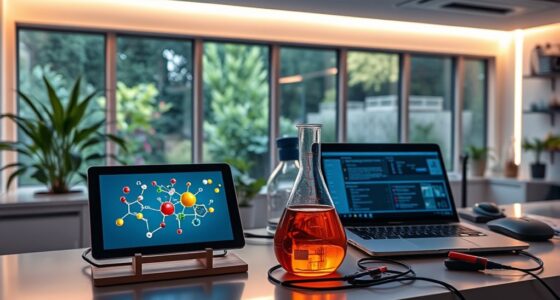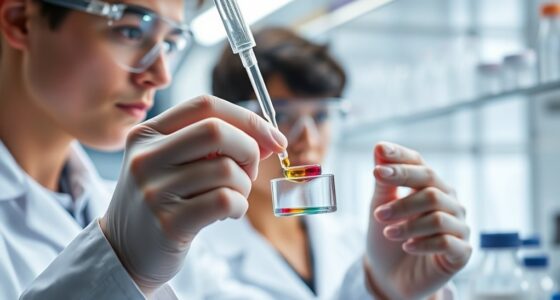As an analytical chemist in pharma, you play a crucial role in ensuring drug safety and effectiveness by testing raw materials, in-process samples, and finished products to meet strict regulatory standards. Your expertise in instrument calibration, troubleshooting, and documentation helps maintain quality and compliance, directly impacting patient safety. Your attention to detail and commitment to regulations build trust with agencies and protect your company’s reputation. Keep exploring to discover how your skills make a real difference in healthcare.
Key Takeaways
- Analytical chemists ensure pharmaceutical products meet safety and quality standards through rigorous testing and documentation.
- They maintain and calibrate analytical instruments to guarantee accurate, reliable results for regulatory compliance.
- Their work involves troubleshooting equipment issues and implementing corrective actions to support consistent product quality.
- Analytical chemists collaborate with quality assurance, manufacturing, and regulatory teams to ensure compliance with industry standards.
- They play a vital role in safeguarding patient health by verifying raw materials, in-process, and finished pharmaceutical products.

If you’re considering a career in the pharmaceutical industry, becoming an analytical chemist offers a dynamic and indispensable role. In this field, your primary focus will be on analyzing raw materials, in-process samples, and finished products to guarantee they meet strict quality standards. Your work directly impacts patient safety, making accuracy and precision essential. One of your key responsibilities will be maintaining regulatory compliance, which requires a thorough understanding of industry regulations such as Good Laboratory Practices (GLP) and Good Manufacturing Practices (GMP). Staying compliant isn’t just about following rules; it’s about building trust with regulatory agencies and ensuring that every product released to the market is safe and effective. You’ll need to meticulously document your procedures, results, and calibration records to demonstrate adherence to regulatory standards. This documentation is critical during audits and inspections, where any deviation from compliance can lead to delays or product recalls.
Analytical chemists ensure product safety by maintaining strict regulatory compliance through meticulous documentation and adherence to industry standards.
Instrument calibration is another fundamental aspect of your daily routine. Accurate measurements depend on well-calibrated instruments, so you’ll regularly verify and adjust analytical equipment to ensure their performance aligns with manufacturer specifications. Calibration isn’t a one-time task; it’s an ongoing process that requires vigilance. If your instruments aren’t properly calibrated, even minor errors can lead to inaccurate data, potentially compromising product quality and regulatory compliance. You’ll need to develop and follow strict calibration schedules, perform routine checks, and maintain detailed calibration logs. This attention to detail guarantees that your analytical results are reliable, helping your team make informed decisions about product quality. Additionally, understanding the performance of electric bikes can serve as a useful analogy for appreciating the importance of precise calibration and maintenance—both require ongoing attention to ensure optimal operation.
In your role, you’ll also troubleshoot issues with instrumentation, identifying the root cause of any deviations and correcting them promptly. This might involve replacing worn components, recalibrating equipment, or updating software. Your ability to maintain and calibrate instruments effectively ensures the integrity of your analytical data, which is essential for making product release decisions. As an analytical chemist, you’ll collaborate closely with quality assurance teams, manufacturing, and regulatory bodies, always aiming to uphold the highest standards. Your work not only supports the integrity of pharmaceutical products but also helps protect the company from regulatory penalties and reputation damage.
Ultimately, your role as an analytical chemist in pharma combines technical expertise with a commitment to compliance and quality. By mastering instrument calibration and regulatory adherence, you help guarantee that life-saving medications meet rigorous standards before reaching patients. It’s a demanding yet rewarding career where your precision and diligence truly make a difference.
Frequently Asked Questions
What Certifications Enhance an Analytical Chemist’s Career in Pharma?
You can enhance your career as an analytical chemist in pharma by obtaining certifications like ASQ’s Certified Quality Auditor or Certified Pharmaceutical GMP Professional. These credentials demonstrate your expertise in regulatory compliance and quality assurance, making you more valuable to employers. They also show your commitment to staying current with industry standards, helping you advance into senior roles and improve your impact on product safety and efficacy.
How Do Analytical Chemists Stay Current With Industry Regulations?
You stay ahead by actively monitoring regulatory updates and engaging in ongoing education. Subscribing to industry newsletters, attending conferences, and participating in workshops keeps you informed of changes. You also network with colleagues and join professional groups, ensuring you’re always aware of the latest standards. This proactive approach helps you adapt quickly, maintaining compliance and advancing your expertise in the ever-evolving pharmaceutical landscape.
What Are Typical Entry-Level Salaries for Pharma Analytical Chemists?
You can expect entry-level salaries for pharma analytical chemists to typically range from $50,000 to $70,000 annually, depending on your location and employer. Industry benchmarks suggest that your starting salary may be influenced by your education, certifications, and relevant internship experience. As you gain more skills and expertise, your salary potential will increase, making this a promising career with steady growth opportunities.
How Does Interdisciplinary Collaboration Work in Pharmaceutical Labs?
In pharmaceutical labs, you embrace cross-disciplinary teamwork and collaborative research initiatives, working closely with chemists, biologists, and engineers. This synergy fosters innovative solutions and guarantees thorough project progress. You share insights and data openly, leveraging diverse expertise to overcome complex challenges. By maintaining clear communication and mutual respect, you create a productive environment where interdisciplinary collaboration enhances drug development and quality assurance, ultimately benefiting patient care.
What Are the Common Challenges Faced by Analytical Chemists in Pharma?
You face challenges like guaranteeing regulatory compliance, which requires strict adherence to industry standards, and mastering sample preparation to get accurate results. Time constraints can add pressure, while maintaining precision across complex analyses demands continuous focus. Staying updated on evolving regulations and new techniques is essential. These hurdles test your technical skills and attention to detail, but overcoming them ensures the integrity and safety of pharmaceutical products.
Conclusion
Stepping into the role of an analytical chemist is like being a detective in a high-stakes mystery. You sift through clues—samples and data—to uncover the truth behind every compound. Remember, your precision guarantees medicines are safe and effective, much like a master chef perfects a recipe. With every discovery, you contribute to life-saving breakthroughs. Embrace this role, knowing your meticulous work is the foundation of trust in the pharma world.









